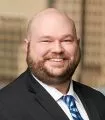In This Issue:
- Q&A with Arnold & Porter PTAB Practitioner Chris Marando
- Q&A with Arnold & Porter PTAB Practitioner Tyler Knox
- Recent PTAB Case Granting a Motion to Amend in an Inter Partes Review: Edwards Lifesciences Corp. v. Cardiovalve Ltd., IPR2021-01051
- Recent PTAB Case Regarding Request for Discovery of an Unfiled Draft Reply Declaration Referenced by Petitioner's Declarant During His Deposition: Twitter, Inc. v. Palo Alto Research Center, Inc., IPR2021-01398
- Federal Circuit Nonprecedential Decision: Mandamus Relief Unavailable to Vacate Order Granting Request for Ex Parte Reexamination and to Terminate Proceedings
- Upcoming Events and Speaking Engagements
How would you describe your practice?
My practice focuses on patent disputes before district courts, the ITC and the PTAB. I began practicing in 2011 and have had the opportunity to work on cases involving a variety of technologies— including semiconductors, medical devices, wearable fitness, mobile phone software, speech recognition software and telecommunications.
How long have you been practicing in front of the USPTO and in front of the PTAB?
The first PTAB proceeding I was involved in was filed in 2014. Since that time, I have steadily worked on matters before the PTAB.
Why were you interested in practicing before the PTAB, and how did you get involved in the practice?
Although I planned to focus on patent litigation, I obtained my USPTO registration number early in my career. When PTAB proceedings became available, I was eager to gain experience in that forum. The PTAB is an efficient forum for resolving validity disputes and, due to the audience, provides an opportunity to craft more in-depth arguments than are typically available in a district court setting.
How would you like to grow your practice before the PTAB?
Over the years, I have worked on PTAB matters from petition filing through trial and appeal. I look forward to continuing to work on every aspect of PTAB matters in the future.
What do you enjoy about practicing at Arnold & Porter?
When I joined the firm in May 2022, I could not have been welcomed more warmly. I have since had the opportunity to get to know many of the lawyers over the past several months and can truly say that the team at Arnold & Porter is exceptionally talented, experienced and collegial.
What do you like to do in your spare time?
I enjoy spending my spare time with my wife and our dog. I also am loyal to my hometown sports teams and enjoy watching their games when I have a chance.
How would you describe your practice?
Holistic breadth with growing depth. Prior to joining Arnold & Porter, I examined patents at the USPTO and interned/worked at a boutique patent law firm. Much of that experience overlapped to provide me great exposure. I would examine patents by day, study patent litigation techniques in law school at night, and then do my best to apply that in a part-time internship on Fridays. This exposed me to the lifecycle of a patent, which I try to keep in mind when assessing issues that arise in my practice today
How long have you been practicing in front of the USPTO and in front of the PTAB?
Almost a decade. Examining for nearly seven years, my Office Actions were always subject to ex parte appellate review by the PTAB, and I learned from its decisions. While working in private practice for the past three years, I have represented petitioners and patent owners in inter partes reviews before the Board.
Why were you interested in practicing before the PTAB, and how did you get involved in the practice?
I appreciate the efficiency, focus and cost savings the PTAB provides to clients and the role it plays in the American patent system.
How would you like to grow your practice before the PTAB?
Experience and proficiency. I have had the opportunity to work on all parts of proceedings before the PTAB, but I expect to learn a lot by doing this more and assuming greater amounts of responsibility while doing it.
What do you enjoy about practicing at Arnold & Porter?
From the onboarding process, I knew I would be surrounded by incredibly talented people. What has blown me away has been everyone's unfettered and unconditional offers to help me in my personal and professional journey.
What do you like to do in your spare time?
Devote it to my family: my wife and three kids. I also really enjoy exploring all the outdoor benefits from living in Colorado like camping, biking and kayaking. For those times we are not out and about, we enjoy connecting with our church and school community and renovating our home as dabbling D-I-Yers.
Recent PTAB Case Granting a Motion to Amend in an Inter Partes Review: Edwards Lifesciences Corp. v. Cardiovalve Ltd., IPR2021-01051
On December 6, 2022, the PTAB granted Patent Owner's non-contingent motion to amend its independent claim and supplemental motion to amend the remaining dependent claims in Edwards Lifesciences Corp. v. Cardiovalve Ltd., IPR2021-01051 (Paper 36).
A motion to amend must meet the statutory and regulatory requirements set forth in 35 U.S.C. § 316(d) and 37 C.F.R § 42.121. Accordingly, before assessing the patentability of any substitute claims, the Board considered whether: (1) the amendment proposes a reasonable number of substitute claims; (2) the proposed claims are supported in the original disclosure (and any earlier filed disclosure for which the benefit of filing date is sought); (3) the amendment responds to a ground of unpatentability involved in the trial; and (4) the amendment does not seek to enlarge the scope of the claims of the patent or introduce new subject matter.
In Preliminary Guidance provided by the Board (Paper 20), the Board determined that the four factors above had been met, and Petitioner had failed to demonstrate that the amended claims were unpatentable. However, in a later Order (Paper 32), the Board noted the presence of deficiencies in the original motion to amend: that Patent Owner had not clarified if the amendments were contingent on a finding of unpatentability of claim 1 and that Patent Owner had not clarified that the dependency of the remaining dependent claims on claim 1 or the amended independent claim 11. Patent Owner submitted new dependent claims and made the new claims dependent on claim 11 in a revised motion to amend.
The Board found that the proposed substitute claims were of a reasonable number as Patent Owner replaced its original claims with the same number of amended claims. The new claims did not enlarge the claim scope or add new matter and responded to a ground of unpatentability in the proceeding.
The Board then evaluated the patentability of the amended claims, noting that petitioner bears the burden of proving that the proposed substitute claims are unpatentable by a preponderance of the evidence. Upon evaluating the amended claims against Petitioner's prior art, the Board found that Petitioner failed to show by a preponderance of the evidence that the amended claims were unpatentable.
Recent PTAB Case Regarding Request for Discovery of an Unfiled Draft Reply Declaration Referenced by Petitioner's Declarant During His Deposition: Twitter, Inc. v. Palo Alto Research Center, Inc., IPR2021-01398
On November 18, 2022, in Twitter, Inc. v. Palo Alto Research Center, Inc., IPR2021-01398 (Paper 33), the PTAB granted in part Patent Owner's Request for Discovery of an unfiled draft reply declaration, which was inadvertently referenced by Petitioner's declarant during his deposition and was alleged to support Patent Owner's claim construction. Patent Owner contended that the draft reply declaration was routine discovery under 37 C.F.R §§ (b)(1)(i) and (iii) based on an alleged inconsistency in claim construction position relative to the filed reply declaration and, alternatively, that the draft reply declaration was discoverable as additional discovery under 37 C.F.R § 42.51(b)(2) in light of the Garmin factors.
The Board granted Patent Owner's request in part as routine discovery, ordering production of the single paragraph of the draft reply declaration (paragraph five) that the expert discussed at deposition, noting that Petitioner did not seek to claw back paragraph five. The Board found that Petitioner had not waived privilege as to the remainder of the draft reply declaration, which remained work product and was therefore not permissible routine discovery.
As to Patent Owner's request under additional discovery, after weighing the Garmin factors, the PTAB similarly determined “that ordering the production of the draft reply declaration is not in the interests of justice, at least with respect to the portions of the declaration other than paragraph five."
Federal Circuit Nonprecedential Decision: Mandamus Relief Unavailable to Vacate Order Granting Request for Ex Parte Reexamination and to Terminate Proceedings
In In re Sound View Innovations, LLC, No. 2022-161 (Fed. Cir. Nov. 22, 2022), the Federal Circuit denied patent owner Sound View Innovations, LLC's petition for a writ of mandamus, which had asked the Federal Circuit to vacate the USPTO's order granting a request for ex parte reexamination because, Sound View argued, the reexamination request raised “substantially the same” art or arguments as a previously denied IPR petition. The Federal Circuit denied the petition because a post-final decision appeal would be an adequate remedy by which Sound View could seek relief based on its §325(d) challenge.
The ex parte reexamination at issue was a second PTO challenge against the same claim of the same patent brought by the same challenger, DISH. In a first challenge, DISH petitioned for inter partes review of a claim based on two references. The Board found no reasonable likelihood of prevailing on those grounds and denied institution of the IPR. Five months later, in a second challenge, DISH requested ex parte reexamination of the same claim based on a combination of the same two references with a new reference. Sound View petitioned the PTO to reject the reexamination request under 35 U.S.C. § 325(d), but the examiner determined that the new combination of references raised a substantial new question of patentability and ordered reexamination. Sound View then filed the mandamus petition challenging the examiner's decision.
In denying Sound View's petition for a writ of mandamus, the Federal Circuit found that Sound View's contested § 325(d) issue may be reviewed in a typical appeal. Citing Cheney v. U.S. Dist. Ct. for D.C., 542 U.S. 367 (2004), the Federal Circuit emphasized that the writ is not “a substitute for the regular appeals process” and is reserved for “exceptional circumstances.” The Federal Circuit also distinguished its decision in In re Vivint, Inc., 14 F.4th 1342 (Fed. Cir. 2021) because that case was a direct appeal after a final decision and that case involved a “nearly identical request for ex parte reexamination based on the same arguments raised in [the requester's] previous IPR petition that was denied based on the requester's abusive filing practices.”
Upcoming Events and Speaking Engagements
- Joint USPTO-FDA Public Listening Session on Collaboration Initiatives, United States Patent and Trademark Office, Alexandria (in-person or virtual attendance, registration required): January 19, 2023, 10:00 am to 5:00 pm ET. The purpose of this listening session is to obtain public input on initiatives for USPTO-FDA collaboration and engagement that aim to promote robust and reliable patent rights while increasing drug and biosimilar competition.
- APJ Job Posting: The USPTO has posted a job opening for an Administrative Patent Judge position. Applications will be accepted between November 23, 2022 to January 31, 2023. Applications can be submitted to the attached link.
- New Commissioner for Patents: The USPTO has announced that Vaishali Udupa will join as the new Commissioner for Patents. Ms. Udupa will oversee the agency's 10,000 employees, taking the place of retiring acting Commissioner of Patents Andrew Faile. The announcement can be found here.
The content of this article is intended to provide a general guide to the subject matter. Specialist advice should be sought about your specific circumstances.









